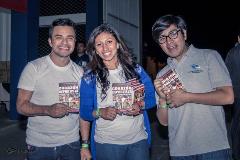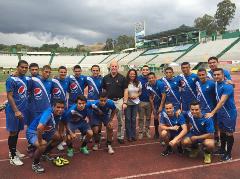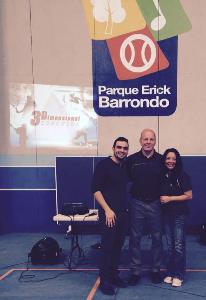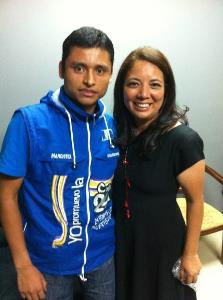After this I saw a vast crowd, too great to count, from every nation and tribe and people and language, standing in front of the throne and before the Lamb… (Revelation 7:9 NLT)
In Apostle John’s vision of Heaven, God revealed a time when representatives from every part of the globe would come together to worship Him. What John didn’t see was the exact plan for how these people would be reached with the gospel.
Some 2,000 years later, Veronica Ochoa has received her own vision for how that passage in Revelation might come to pass.
“I believe sports has a key role in the Great Commission, especially in the times we are living now, where social, political and religious barriers are being raised higher and evangelism is becoming more difficult every day,” she says. “I am convinced that the only way to get to the tribes, tongues and unreached people groups is through sports.”
Here’s the ironic twist to Ochoa’s story: she’s not a coach. She’s not an athlete, either. Yet Ochoa has completely sold out to the concept of reaching the lost through sports ministry.
It all started in 2006, when she volunteered for a World Cup kickoff event.

Spanish Heart of an Athlete books were handed out at the Olympic swearing in ceremony for Guatemalan athletes.
“I was used to being rejected whenever I tried to share the gospel,” Ochoa says. “But for the first time, I saw people enjoying hearing about Jesus, and it was effective! I was resolved then. I knew it was time to start doing things differently.”
In 2007, Ochoa began a four-year process that took her through three levels of international sports leadership training and concluded with a trip to South Africa in 2011. Ochoa describes that experience as “a time of transformation.”
“I learned that I don’t know my own limits, but God does,” she adds. “And there are no limits when He is leading.”
At the beginning of her journey, Ochoa partnered with another woman, a physical education teacher, in an effort to organize sports activities at orphanages. They also spent time in prayer each month to seek out divine direction. When she returned from South Africa in 2011, she traveled to Venezuela where she shared her concept for a sports conference with some ministry leaders there.
That same year, Ochoa met Jim Roquemore, FCA Regional International Coordinator for Latin America, at a conference in Ecuador. A year later, Roquemore was in Guatemala for Ochoa’s first sports conference in her home country. FCA Executive Vice President of International Dan Britton spoke at the conference in 2013 while Roquemore returned for her third annual event in 2014. Throughout the process, Ochoa saw the opportunity to utilize FCA’s resources and sports ministry training to reach the sports community in her country.

Jim Roquemore and Veronica Ochoa organized a Huddle for the Guatemalan soccer league six time championship team.
“We saw the amazing things she had done and we just wanted to come alongside of her and begin walking with her,” Roquemore says. “She’s not an athlete or a coach, but she gets it and sees the value of sports ministry. She also understands the importance of ministering to the coaches. God has given her great influence in Guatemala and throughout Latin America.”
Ochoa’s conferences can be likened to a secular school assembly. While she and her speakers, like former pro soccer athlete Chalo Romero, share about the importance of the coaches, they can also share the gospel and give testimonies. Among the 800 to 1,000 people that attend annually, there are coaches, athletes, business leaders, politicians and pastors who benefit greatly from the experience and are empowered to take what they’ve received back into their own spheres of influences.
This year, Ochoa also hosted her first 3Dimensional Coaching training. Over five days, the conference ministered to 137 people including influential members of the Olympic committee and the Ministry of Culture and Sports, along with representatives from various federations and schools. The 3D training has been overwhelmingly received and will be integrated into the curriculum of the Soccer Federation School of Guatemala. Along with Jim Roquemore and her staff, Ochoa took the training to the National University, the Comunicaciones Soccer Club, and the Olympic Committee Foundation.
From those conferences, many incredible ministry connections have been made with the government, the private universities and into the sports culture found mostly at club and professional levels.

FCA Guatemala held their first 3D Coaching Guatemala seminar with 60 people from different sports governing committees and the soccer federation.
But for Ochoa, it’s her team’s work in a juvenile prison that she deems most rewarding. This past May, Ochoa and her team put on a sports camp for the boys that included surfing, skateboarding and basketball. Through the discipleship time, Ochoa says a spirit of revival broke out and led to several baptisms.
“The sports camps let us see the impact we can have on a young person in one day,” she says. “But the impact is double that. We are also being ministered to and growing in a way that allows us to see what happens when you use sports to transform lives and make disciples.”
In order to achieve her long-term goals, Ochoa has partnered with several church organizations. She sells coffee to raise support and receives additional funds from her mentor in the United States, a children’s minister who collects offerings from her young students.
“It is not much,” Ochoa says, “but the blessing coming from children makes my heart rejoice.”
One of Ochoa’s biggest challenges is transportation. Guatemala has a long history with street violence and traveling via train can be a harrowing experience. She is praying for a truck that will allow her to be more mobile and secure.

Ochoa with Olympic speed walking silver medalist Erick Barrondo.
In the meantime, Ochoa continues to plan for expansion throughout the nation and seeks more volunteers who share in her mission. She dreams of the day when she has access into the public school system and begins to bring sports to school kids who, unless part of the club system, remain underexposed to the possibilities that such team activities afford. Ultimately, her goal is to help Apostle John’s prophetic vision come to pass.
“God can use sports to transform lives and bring hope to the hopeless,” Ochoa says. “Once the local churches see what we’re doing, we can do even more. That’s the key to opening even more doors and bringing more people to Christ.”
Five Facts About Guatemala
1. Guatemala is a Central American country located south of Mexico with a population of 15.8 million people.
2. Just over 41 percent of the Guatemalan population is Mestizo (also called Ladino), while another 41 percent come from a variety of indigenous groups. About 18 percent are white or European. Spanish is the official language and spoken by 93 percent of the population.
3. Guatemala boasts the largest economy in Central America yet is one of the poorest nations in Latin America. Some of its main exports are fruits, vegetables, flowers, clots and the raw materials needed to create bio-fuels.
4. Christianity is the dominant religion of Guatemala. Roughly 57 percent of the population identifies as Roman Catholic, while another 28 percent are Protestant. The next highest percentage, however, is the 11 percent who claim no religious affiliation.
5. Sports are a very prominent part of Guatemalan culture. Soccer is considered the most popular sport, but baseball, basketball, volleyball and kickboxing are also closely followed. Some notable athletes from Guatemala include soccer stars Carlos Ruiz, Gustavo Cabrera and Guillermo Ramirez, and Erick Barrondo, who won the nation’s first Olympic medal (20-km race walk) at the 2012 Summer Games in London.